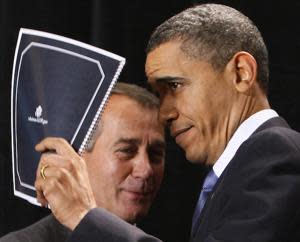 The Lookout
The LookoutTaming deficit means pain for middle class, poor

It's easy to dismiss the ongoing palaver over the deficit as just another Washington sideshow, with little connection to people's everyday lives. But the spending cuts and tax hikes that are on the table would have a major impact on most Americans—especially members of the middle class and the poor.
The Wall Street Journal focuses today on those in the middle. "You can't address our fiscal situation without asking the vast bulk of the middle class to make a contribution," Robert Reischauer, a Democrat and former director of the Congressional Budget Office (CBO) told the Wall Street Journal.
"It's pretty clear that there isn't enough money to just tax the rich," another former CBO director, Republican Douglas Holtz-Eakin, put it. "I don't think the strategy will be let's hammer the poor. By process of elimination, you end up touching many more Americans."
Both of those assertions are debatable. As this chart from the Congressional Budget Office shows, the long-term deficit problem could in fact be fixed by 2016 if Congress simply does nothing. That would mean letting the Bush tax cuts for high earners expire—a popular idea that's very much under consideration. But it also would mean no longer raising the rate at which Medicare reimburses doctors, something Congress routinely does to ensure that doctors continue to accept Medicare insurance. Ending the "doc fix" just isn't likely to happen.
And Holtz-Eakin's notion that the poor will escape from the process largely unscathed is also likely off-base. To take just the most obvious example, cuts to Medicaid have been floated by members of both parties, including President Obama. Who does Holtz-Eakin think the program serves?
Still, it's likely that, as the Journal explains, efforts to rein in the deficit will indeed also hit middle-class families—roughly defined as those households that earn more than the poorest 40 percent, but less than the richest 10 percent. In other words, everyone making between $33,000 and $163,000 a year.
Medicare is the clearest example. The growth in Medicare spending is by far the main driver of our long-term budget woes, so there's little doubt that will need to be slowed. Some of the proposals on the table—most prominently one by Rep. Paul Ryan (R-Wisc.)—do so by reducing the value of future benefits. Since 15 percent of Americans are on Medicare, that will hit millions of middle-class Americans hard.
Similarly, members of both parties, including President Obama, have suggested raising the eligibility age for Medicare to 67, from 65. Again, that would fall on the backs of the program's mostly middle-class beneficiaries.
And that leaves aside the idea of raising the retirement age for Social Security to 70 from 65, something that members of both parties have suggested, and which of course would hit middle-class families hard
It's not just spending cuts, either. On the revenue side, too, middle-class Americans could feel it acutely. For instance, Washington is mulling ending or reducing the mortgage interest tax deduction, for which more than half the $79.2 billion in benefits go to the middle class. The same goes for a provision that allows homeowners to deduct property taxes from their tax return, which currently costs the federal government more than $15 billion a year.
In other words, the fight over the budget deficit isn't just about scoring political points—despite the impression you might get from some of the participants and the media outlets covering it. It's also about issues that affect American lives every day.
